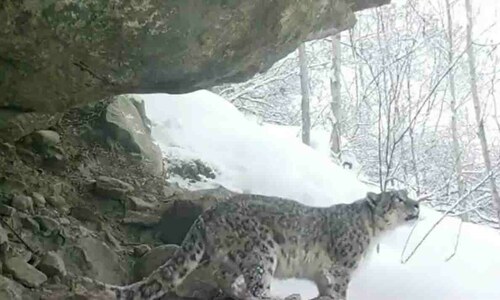GILGIT: Snow leopards, commonly known as the ounce, are on the brink of extinction in Pakistan due to human conflict and impact of climate change, with experts confirming a declining population.
Pakistan is among just 12 countries hosting these elusive cats, with 80 per cent of their habitat situated in Gilgit-Baltistan (GB).
Haidar Raza, World Wide Fund for Nature (WWF) Pakistan Director North, highlights the distressing reality of a global population of only 6,000 to 6,500 snow leopards, including a mere 300 to 400 in Pakistan.
Worryingly, merely 25pc of their worldwide habitat is protected.
Endangered animals face diminishing habitats due to climate change
As the exact population remains unknown, there is a dire need for immediate conservation efforts to safeguard these creatures.
The human factor
“The increasing human activities lead to decreasing habitat, fragmentation, hampering the movement of snow leopards, particularly in lowlands where it searches for prey or mates, the human activities in wildlife protected areas disturb snow leopards,” he said.
Notably, the WWF has observed that since the completion of the Karakoram Highway in the 1970s, Gilgit-Baltistan has experienced rapid linear infrastructure development.
Another factor of decreasing population of snow leopards is human conflict.
“When snow leopards attack livestock for food, owners kill the elusive cat to ensure protection of their livestock, that is biggest threat to survival of snow leopards in GB,” he said.
“Snow leopard kills hundreds of livestock in a single go. To reduce human conflict, people can be motivated for not taking retaliation actions by offering incentives,” he said.
He lamented that there was no proper mechanism to eliminate the conflict with human beings.
The WWF has been diligently working to establish early warning systems capable of detecting potential snow leopard attacks on livestock.
A pilot project has already seen the installation of such a system in Khyber village, Hunza. This system monitors snow leopard movement and provides real-time data to generate vital warnings, significantly aiding in livestock protection.
Dr Hussain Ali, a senior regional programme manager with the Snow Leopard Foundation (SLF), underscores the primary threat to the population of snow leopards, which primarily feed on natural prey like ibex, Markhor, Ladakh Urial, Marcopolo Sheep, and Blue Sheep.
His organisation actively engages in the protection of snow leopards in GB. In select GB villages, the SLF has introduced livestock insurance policies to ensure the safety of these magnificent creatures and the communities that depend on them.
Experts say when snow leopards can’t found prey, they attack livestock, and in retaliation owners of such livestock either shot them dead or poison them. For the purpose, they apply poison to the carcass of a dead animal and leave it in open areas. When snow leopards eat the dead animal, they die. This is the most common method used by villagers in remote areas of Gilgit-Baltistan to kill snow leopards in order to prevent attacks on livestock.
Climate change
In the past, snow leopards inhabited Swat and Kohistan in Khyber Pakhtunkhwa, but have since relocated to GB, Chitral, and AJK mountains, mainly in the Karakoram, Himalayan, Hindukush, and Pamir mountain ranges. Climate change has led to a rapid decline in their snow-covered habitat.
Dr Ali estimates Pakistan’s snow leopard population at approximately 150 to 200, though an exact figure remains uncertain.
Ecologist Dr Saeed Abbas says there are multiple challenges these elusive cats face, including human conflicts, diminishing habitats due to climate change, habitat fragmentation from human activities, and the heartbreaking poaching of snow leopards for their teeth and bones by locals.
Regrettably, experts confirm a significant decline in the snow leopard population across GB. Locals who used to spot them frequently at high altitudes now report no sightings.
Published in Dawn, October 25th, 2023















































Dear visitor, the comments section is undergoing an overhaul and will return soon.